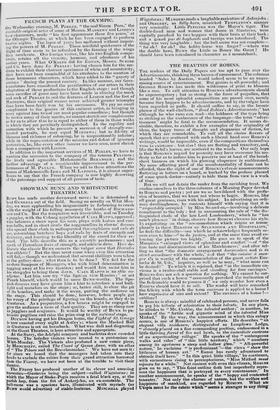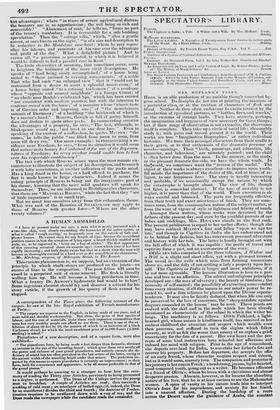THE BEAUTIES OF ROBINS.
THE readers of the Daily Papers are too apt to pass over the Advertisements, thinking them barren of amusement. The columns headed "Sales by Auction," would indeed seem to be an unpro- mising source of entertainment. But genius is all-powerful; and GEORGE ROBINS has made this wilderness of print to blossom like a rose. To call attention to ROBINS'S advertisements should be supererogatory ; but so strong is the force of prejudice, that some of his most splendid compositions are passed over, merely because they happen to be advertisements, and by the vulgar have been regarded as puffs. It should suffice to say, in the laconic phrase of the wall-chalkers, "Read Robins's Advertisements ;" but although he who runs can read—the boldness of the type being as striking as the exuberance of the language—the term "adver- tisement' might be fatal to the recommendation. It seems de- sirable, therefore, to exhibit a few examples of the originality of ideas, the happy turns of thought and elegancies of diction, for which they are remarkable. To cull all the choice flowers of' speech that are scattered with such a liberal hand over Reruss's writings, would be impossible, even if the compositions themselvea were in existence but alas I they are fleeting and transitory, and, like the Sybirs leaves, are scattered to the winds. Our only hope is that Rosuars's regard for posterity may have overcome his mo- desty so far as to induce him to preserve one at least of the broad- sheet banners on which his glowing eloquence is emblazoned. No more affecting proof of the unsubstantiality of fame can be afforded, than the sight of one of ROBINS'S classic announcements fluttering in tatters on a hoard, or busked by the profane placard of some quack-doctor—entirely to hide them from view is a work of time.
But we will not detain the reader from the ravishing treat. We confine ourselves to the three columns of a Morning Paper devoted to ROBINS and poetry ; yet are we so bewildered with the profu- sion of beauties, that we know not where to begin. ROBINS, like all great geniuses, rises with his subject. In advertising an ordi- nary dwellinghouse, he contents himself with saying that it is "respectably occupied" by Miss So-and-so,—involving a delicate compliment to the lady : but in announcing the sale of "the dis- tinguished abode of the late Lord Londonderry," which he "has much pleasure" in doing, observe how ROBINS elevates his style. In expatiating on the "accommodation which reigns so trium- phantly in these REGIONS OF SPLENDOUR AND IIOSPITALITY;' he feels the difficulty—one which he acknowledges frequently oc- curs even to him—" to do justice, and at the same time avoid co- louring the picture too highly." He goes on to speak of the Marquis's "enlarged views of splendour and comfort "—of "the fine taste and discrimination of his Marchioness;" and after tel- ling us that "the domestic arrangement harmonizes and is in strict accordance with the whole," and that "the cuisine a man- ger (!) is worthy of the commendation of the great artiste Ens- tache de St. Ude, inquires, as well as he may, "what more can be desired?" To which it is rejoined, that "in the immediate en- virons is a twelve-stall stable and standing for four carriages." Roam does not ask a question for nothing. We cannot be sur- prised that such a house "necessarily provoked the inclination of the fashionable world to possess it :" a e only wonder how even a Roams should have it to sell. The reader will have remarked the felicity with which the term environs is applied to a house I how expressive of size and extent! The environs of a house !— sublime !
ROBINS is always mindful of celebrated persons, and never fails to pay his tribute of admiration to their talents. In one place, he alludes to "Mr. Crabbe, the talented author;" in another, he speaks of the " fertile and gigantic mind of the talented Miss Mitford." By the way, the announcement in which this eulogy occurs, is one of ROBINS'S happiest efforts. Ile describes "an elegant villa residence, distinguished as Langdown Lodge, "cleverly placed on a fine commanding position, embosomed in a little thriving forest of firs and larch, in the immediate environs' of an -unpretending village." He speaks of the •" umbrageous walks and rides of " this little territory," which " numbers among its agremens a steep and- hollow glen." "All-powerful nature," he exclaims " is predominant "—the views " show the littleness of human art." " Ennui has rarely adventured to obtrude itself here." "In this quiet little village," he continues, with earnestness rising to peremptoriness, "Miss Mitford must sojourn for a while. Not content with even this climax, ROBINS goes on to say, "This faint outline doth but imperfectly repre- sent the happiness that is portrayed in every countenance." Is another announcement, he speaks of the "happy and contented tenantry." Not only the charms of nature, but the welfare and happiness of mankind, are regarded by Roams. What an, Utopia must be the Mate which "seems a stranger to any thing but advantages ;" where "in times of severe agricultural distress the tenantry are in no apprehension ; the soil being so rich and convertible!" "Abatement of Tent," he tells us, "forms no part of the tenant's vocabulary. It is irresistible for a safe building speculation." Then the " cottage villa," which, " after a gentle ascent, at once bursts on the sight,- "is eta size and description to he seductive to the Maidstone merrhant ; where he may repose after his labours, and ruminate at his ease over the advantage and profit of the day." What a delightful picture ! And to crown all, "a panorama is presented, to which it is believed it would be difficult to find a parallel case in Kent."
The little obscurities of meaning, that sometime occur, serve to heighten the brilliancy of the more vivid descriptions. He speaks of "land being easily accomplished ;" of a house being suited to "those inclined to evening amusements;" of a noble Earl who had such "an enlarged view " that it "could not be restrained from a desire to erect a splendid music-room ;" of a house being suited "to a retiring tradesman ;" of a residence whose "opposite and nearest neighbour" is a foreign Count; of "an abode near Beulah's celebrated Spa," which has been erected "not consistent with modern practice, but with the intention to continue coeval with the lease ;" of a mansion whose "classic taste is of Grecian order and imposing size;" of "the mountainous summit of Dartmoor;" of a building "the brickwork of which is by a master's hand." Roe' xs, though so full of poetry himself, does not disdain to quote other poets. In enumerating seriatim the advantages of a property, he says, "The last, although, as Shakspeare would say, not least in our dear love:" Even in speaking of the custom of a coffeeshop, he quotes MisTees: "the rooms," he tells the public "are filled from morn to noon, from noon till dewy eve." One more example : in characterizing a re- sidence near Evesham, he says, "from its situation it would scent that nature in its bounty had ordained it for one of the Represen- tatives of Evesham; for cePry window would enable hint to look over his respectable constituency !" The tact with which ROMNS seizes upon the most minute cir- cumstance to illustrate the subject of his description, and to enrich it with lofty associations, is another indication of the poetic mind. Has a king dined in the house, or a lord offered to purchase, the fact is made known in large characters. Indeed it seems the ruling principle of ROBINS to bring out the imaginative part of his theme, knowing that the more solid qualities will speak fin themselves. Thus, we are inthrmed in Brobdil.s,nagian characters, that there are " Marvoitt AL RIGHTS," while the fitet that they "are of little importance" is in small type. But we must- tear ourselves away from this exhaustless theme. What was said of the Beauties of SU Alt%PE ARE may apply to those of ROBINS with greater force—" Where are the other twenty volumes?"





















 Previous page
Previous page